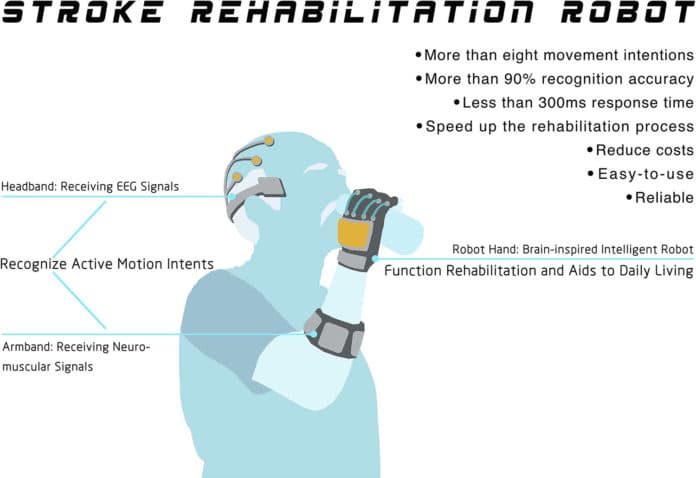A stroke occurs when the part of the brain loses its blood supply and stops working. Stroke is the leading cause of death and disability in the adult population. 75% of the surviving patients will lose the ability to move independently.
Traditional stroke rehabilitation equipment allows patients to follow the movements of the equipment latently. Henceforth, the rehabilitation effect is poor, and the patient’s willingness to train is likewise low.
Now, Tongji Hospital and BrainCo have introduced NCyborg Project, a new stroke rehabilitation pattern based on brain-computer interface (BCI) and brain-inspired intelligent robots. The project will mainly focus on:
- An algorithm for analyzing the movement intention of stroke patients based on brain-machine interface technology.
- A motion control strategy for a rehabilitation robot based on brain-inspired motion perception.
- The mechanism of stroke rehabilitation using brain-inspired intelligent robots.
The main aim of the NCyborg Project is to develop an easy-to-use, reliable and affordable stroke rehabilitation robot to improve the rehabilitation effect of stroke survivors, speed up the rehabilitation process, and reduce the costs.
The organization will start training the robot to support the rehabilitation of the hand. The robot is expected to recognize no less than eight hand movement intentions with a recognition accuracy of ≥ 90% and a response time ≤ of 300 ms.
Co-corresponding author, Jonh H. Zhang, explains: “The project’s goal is to develop an easy-to-use, reliable and affordable stroke rehabilitation robot that will improve the effect of rehabilitation for stroke survivors, speed up the rehabilitation process, and reduce the costs involved.”
Co-corresponding author, Bicheng Han, adds: “We hope that, within five years, millions of stroke patients will be using this product and see their lives improve.”
Co-corresponding author Zhouping Tang said, “the ‘N’ in the NCyborg Project name stands for ‘neural,’ while in fictional stories ‘cyborg’ is often an icon that is enhanced mentally and/or physically over and above the ‘norm’ with technology. In the real world, we believe that NCyborg Project will set up a brand-new stroke rehabilitation pattern which could qualitatively improve the treatment effect for stroke survivors.”
Journal Reference:
- Qi Huang et al. NCyborg Project – A new stroke rehabilitation pattern based on brain-computer interface. DOI: 10.1016/j.hest.2021.05.002
